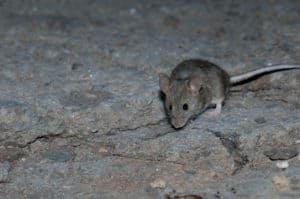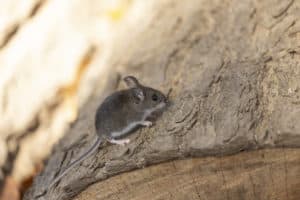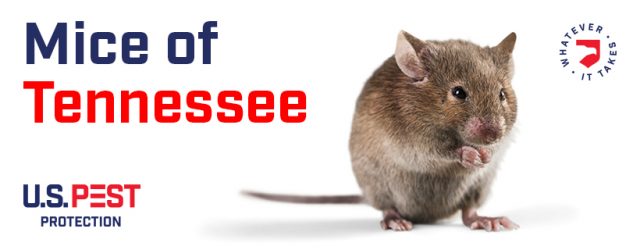Common Mice in Tennessee – What do you think of when someone mentions a mouse or a rat? Do images of unsanitary alleyways and urban decay come to mind? Or do you flashback to your childhood and that time your parents took you to Disney World to meet Mickey Mouse?
For better or worse, mice are one of the most common pests in Middle Tennessee due to their ability to reproduce rapidly. The most common types of mice in Tennessee are house mice, deer mice, and cotton deer mice. Here is what you need to know to protect what matters most from your friends at U.S. Pest Protection.
House Mouse
The aptly named house mouse loves to hang around your home (i.e., their food source.) This pest is the most well-known rodent in the state of Tennessee. If you happen to spot one roaming around your house then you’ve likely got a mice problem; There is never just one house mouse in your home. Their diet consists of grains, seeds, leaves, insects, and human food. In addition, they will chew on pretty much anything they can get their teeth on in your home including your winter wardrobe, furniture, and the structure of your home. A house mouse can pass through an opening as small as one-half of an inch meaning that nothing is off-limits to their destruction. Likewise, these critters love to travel. Don’t allow your home to become a resort for this common pest.
House Mouse Statistics:
- Length: 5 to 8 inches
- Tail Length: 2.4 to 4 inches
- Ears: .4 to .8 inches
- Weight: .5 to 1 ounce
- Breeding Habits: House mice will breed year-round, but peak between spring and fall. Females usually produce 5 to 10 litters per year but can have as many as 14 litters. Each litter can deliver up to 13 new mice.

Common House Mouse
Deer Mouse
White-Footed Deer Mouse
The white-footed deer mouse spends a majority of its life climbing and living in trees. They often convert old bird nests into their own homes by constructing a roof for them. They don’t often target human businesses and houses for shelter, but it’s not impossible to find the random deer mouse hanging out in your kitchen. Construction is a huge reason why you may begin to see them edging closer to human activity. White-footed mice are the primary carriers of the Lyme bacterium Borrelia burgdorferi, making them key in the spread of Lyme disease. Avoid these dudes at all costs. (Well, we don’t recommend demolishing your house, but you get the idea.)
White-Footed Deer Mouse Statistics:
- Length: 5.5 to 8.4 inches
- Tail: 2.5 to 4 inches
- Ears: .6 to .8 inches
- Weight: .4 to 1 ounce
- Breeding Habits: Breeding activity is strongest from early spring to late summer. Some females can have as many as 5 litters per year with an average of 4 new young per litter.

Deer Mouse
Cotton Deer Mouse
The typical habitat of the cotton deer mouse is somewhere moist, such as timbered river bottoms or a swamp. They can also be found in caves and cliffs. Much like the white-footed deer mouse, construction can be the reason you begin to see more of this rodent. A cotton mouse will eat just about anything it can find, including acorns, fungi, insects, snails, and spiders. This rodent is also one to be avoided as they are carriers of Hantavirus. Again, fire is not a form of pest control.
Cotton Deer Mouse Statistics:
- Length: 6.4 to 8.3 inches
- Tail: 2.8 to 4 inches
- Ears: .7 inches
- Weight: .75 to 1.6 ounces
- Breeding Habits: Cotton deer mice are most active from fall to spring. 3 to 4 litters per year is the norm with litter sizes ranging from 1 to 7 mice.
House Mouse vs Deer Mouse
The house mouse and deer mouse are the two species of mice most common in Middle Tennessee. If you happen to see a mouse, chances are it’s one of these guys. Knowing the differences can be the deciding factor in how quickly a pest control professional can address whatever issues they may be creating and formulate an effective pest management plan. After all, knowing is half the battle.
- House mice like to nest in homes when the temperature begins to drop while deer mice prefer open fields and more forested areas (Under certain circumstances they will find their way into homes and businesses.)
- House mice have gray fur whereas deer mice have brown fur with white feet and underbellies.
- Both mice can pass along salmonella (food poisoning), allergies, and plague. The deer mouse can also carry the dangerous Hantavirus.
Fears and Perceptions
Fear of mice and rats is one of the most common phobias people have, along with spiders. Musophobia (the fear of rodents) is more often than not a conditioned response to being startled as opposed to a real disorder. Of course, it doesn’t help that mice have consistently been used in the film industry to instill fear and revulsion in the audience. While folks like Walt Disney have made attempts to avenge the public perception of mice, you probably still don’t want to see one scurrying around your home.
Economic Significance of Rodents
Mice are quite the paradox. They are both a significant pest and highly beneficial to the economy in Tennessee.
- They consume and damage up to one-third of our food sources per year
- From their constant gnawing mice destroy clothing, furniture, structures, and can be the root cause behind fires
- Mice are excellent at transmitting many diseases dangerous to humanity including rodent allergies, plague, food poisoning, and hantavirus
However, the biggest threat that mice pose is contamination. An individual mouse can excrete between 40 and 100 droppings per day and leave behind thousands of microdroplets of urine as it travels.
Mice aren’t all bad though. Rodents play a critical role in biomedical research due to their similarity to humans (yes, mice are a lot like us. Neat, huh?) Advantages include their small size, short life cycle, ease of maintenance, and genetic resources. In short, we need mice in order to progress our medical efforts.
Mice Management in Tennessee
Natural predation will not keep rat and mouse populations in check. Dogs and cats might catch the occasional house mouse, but they are not effective at controlling established rodent infestations. House mice and deer mice are equally troublesome. Spare yourself and your family of the mice most common to Tennessee homes by hiring a professional pest control company such as U.S. Pest Protection. We’ll go above, below, around, and in that strange corner full of cobwebs to ensure your home is rodent-free.

